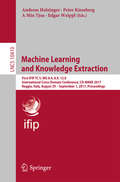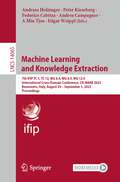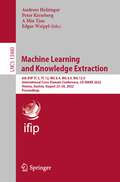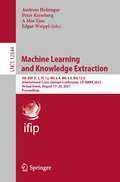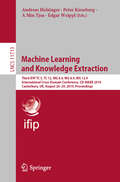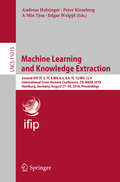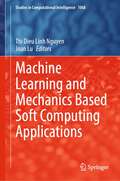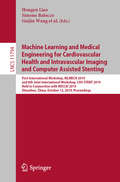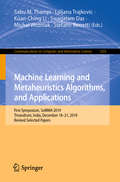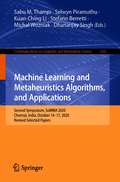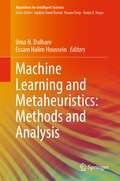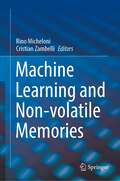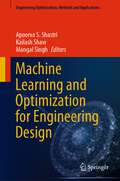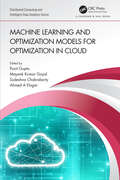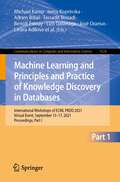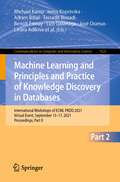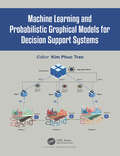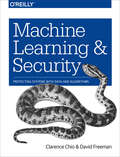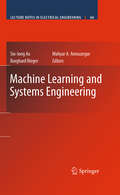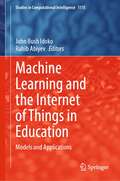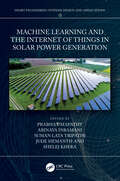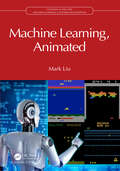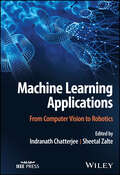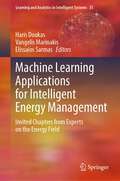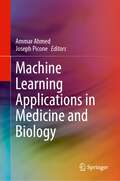- Table View
- List View
Machine Learning and Knowledge Extraction: First IFIP TC 5, WG 8.4, 8.9, 12.9 International Cross-Domain Conference, CD-MAKE 2017, Reggio, Italy, August 29 – September 1, 2017, Proceedings (Lecture Notes in Computer Science #10410)
by Andreas Holzinger, Peter Kieseberg, A Min Tjoa and Edgar WeipplThis book constitutes the refereed proceedings of the IFIP TC 5, WG 8.4, 8.9, 12.9 International Cross-Domain Conference for Machine Learning and Knowledge Extraction, CD-MAKE 2017, held in Reggio, Italy, in August/September 2017.The 24 revised full papers presented were carefully reviewed and selected for inclusion in this volume. The papers deal with fundamental questions and theoretical aspects and cover a wide range of topics in the field of machine learning and knowledge extraction. They are organized in the following topical sections: MAKE topology; MAKE smart factory; MAKE privacy; MAKE VIS; MAKE AAL; and MAKE semantics.
Machine Learning and Knowledge Extraction: 7th IFIP TC 5, TC 12, WG 8.4, WG 8.9, WG 12.9 International Cross-Domain Conference, CD-MAKE 2023, Benevento, Italy, August 29 – September 1, 2023, Proceedings (Lecture Notes in Computer Science #14065)
by Andreas Holzinger Peter Kieseberg Federico Cabitza Andrea Campagner A Min Tjoa Edgar WeipplThis volume LNCS-IFIP constitutes the refereed proceedings of the 7th IFIP TC 5, TC 12, WG 8.4, WG 8.9, WG 12.9 International Cross-Domain Conference, CD-MAKE 2023 in Benevento, Italy, during August 28 – September 1, 2023. The 18 full papers presented together were carefully reviewed and selected from 30 submissions. The conference focuses on integrative machine learning approach, considering the importance of data science and visualization for the algorithmic pipeline with a strong emphasis on privacy, data protection, safety and security.
Machine Learning and Knowledge Extraction: 6th IFIP TC 5, TC 12, WG 8.4, WG 8.9, WG 12.9 International Cross-Domain Conference, CD-MAKE 2022, Vienna, Austria, August 23–26, 2022, Proceedings (Lecture Notes in Computer Science #13480)
by Andreas Holzinger Peter Kieseberg A Min Tjoa Edgar WeipplThis book constitutes the refereed proceedings of the 6th IFIP TC 5, TC 12, WG 8.4, WG 8.9, WG 12.9 International Cross-Domain Conference, CD-MAKE 2022, held in Vienna, Austria during August 2022.The 23 full papers presented were carefully reviewed and selected from 45 submissions. The papers are covering a wide range from integrative machine learning approach, considering the importance of data science and visualization for the algorithmic pipeline with a strong emphasis on privacy, data protection, safety and security.
Machine Learning and Knowledge Extraction: 5th IFIP TC 5, TC 12, WG 8.4, WG 8.9, WG 12.9 International Cross-Domain Conference, CD-MAKE 2021, Virtual Event, August 17–20, 2021, Proceedings (Lecture Notes in Computer Science #12844)
by Andreas Holzinger Peter Kieseberg A Min Tjoa Edgar WeipplThis book constitutes the refereed proceedings of the 5th IFIP TC 5, TC 12, WG 8.4, WG 8.9, WG 12.9 International Cross-Domain Conference, CD-MAKE 2021, held in virtually in August 2021.The 20 full papers and 2 short papers presented were carefully reviewed and selected from 48 submissions. The cross-domain integration and appraisal of different fields provides an atmosphere to foster different perspectives and opinions; it will offer a platform for novel ideas and a fresh look on the methodologies to put these ideas into business for the benefit of humanity.
Machine Learning and Knowledge Extraction: Third IFIP TC 5, TC 12, WG 8.4, WG 8.9, WG 12.9 International Cross-Domain Conference, CD-MAKE 2019, Canterbury, UK, August 26–29, 2019, Proceedings (Lecture Notes in Computer Science #11713)
by Andreas Holzinger Peter Kieseberg A Min Tjoa Edgar WeipplThis book constitutes the refereed proceedings of the IFIP TC 5, TC 12, WG 8.4, 8.9, 12.9 International Cross-Domain Conference for Machine Learning and Knowledge Extraction, CD-MAKE 2019, held in Canterbury, UK, in August 2019.The 25 revised full papers presented were carefully reviewed and selected from 45 submissions. The cross-domain integration and appraisal of different fields provides an atmosphere to foster different perspectives and opinions; it will offer a platform for novel ideas and a fresh look on the methodologies to put these ideas into business for the benefit of humanity.
Machine Learning and Knowledge Extraction: Second IFIP TC 5, TC 8/WG 8.4, 8.9, TC 12/WG 12.9 International Cross-Domain Conference, CD-MAKE 2018, Hamburg, Germany, August 27–30, 2018, Proceedings (Lecture Notes in Computer Science #11015)
by Andreas Holzinger Peter Kieseberg A Min Tjoa Edgar WeipplThis book constitutes the refereed proceedings of the IFIP TC 5, WG 8.4, 8.9, 12.9 International Cross-Domain Conference for Machine Learning and Knowledge Extraction, CD-MAKE 2018, held in Hamburg, Germany, in September 2018.The 25 revised full papers presented were carefully reviewed and selected from 45 submissions. The papers are clustered under the following topical sections: MAKE-Main Track, MAKE-Text, MAKE-Smart Factory, MAKE-Topology, and MAKE Explainable AI.
Machine Learning and Mechanics Based Soft Computing Applications (Studies in Computational Intelligence #1068)
by Thi Dieu Linh Nguyen Joan LuThis book highlights recent advances in the area of machine learning and robotics-based soft computing applications. The book covers various artificial intelligence, machine learning, and mechanics, a mix of mechanical computational engineering work. The current computing era has a huge market/potential for machine learning, robotics, and soft computing techniques and their applications. With this in view, the book shares latest research and cutting-edge applications useful for professionals and researchers in these areas.
Machine Learning and Medical Engineering for Cardiovascular Health and Intravascular Imaging and Computer Assisted Stenting: First International Workshop, MLMECH 2019, and 8th Joint International Workshop, CVII-STENT 2019, Held in Conjunction with MICCAI 2019, Shenzhen, China, October 13, 2019, Proceedings (Lecture Notes in Computer Science #11794)
by Hongen Liao Simone Balocco Guijin Wang Feng Zhang Yongpan Liu Zijian Ding Luc Duong Renzo Phellan Guillaume Zahnd Katharina Breininger Shadi Albarqouni Stefano Moriconi Su-Lin Lee Stefanie DemirciThis book constitutes the refereed proceedings of the First International Workshop on Machine Learning and Medical Engineering for Cardiovasvular Healthcare, MLMECH 2019, and the International Joint Workshops on Computing and Visualization for Intravascular Imaging and Computer Assisted Stenting, CVII-STENT 2019, held in conjunction with MICCAI 2019, in Shenzhen, China, in October 2019. For MLMECH 2019, 16 papers were accepted for publication from a total of 21 submissions. They focus on machine learning techniques and analyzing of ECG data in the diagnosis of heart diseases. CVII-STENT 2019 accepted all 8 submissiones for publication. They contain technological and scientific research concerning endovascular procedures.
Machine Learning and Metaheuristics Algorithms, and Applications: First Symposium, SoMMA 2019, Trivandrum, India, December 18–21, 2019, Revised Selected Papers (Communications in Computer and Information Science #1203)
by Kuan-Ching Li Swagatam Das Sabu M. Thampi Michal Wozniak Stefano Berretti Ljiljana TrajkovicThis book constitutes the refereed proceedings of the First Symposium on Machine Learning and Metaheuristics Algorithms, and Applications, held in Trivandrum, India, in December 2019.The 17 full papers and 6 short papers presented in this volume were thoroughly reviewed and selected from 53 qualified submissions. The papers cover such topics as machine learning, artificial intelligence, Internet of Things, modeling and simulation, disctibuted computing methodologies, computer graphics, etc.
Machine Learning and Metaheuristics Algorithms, and Applications: Second Symposium, SoMMA 2020, Chennai, India, October 14–17, 2020, Revised Selected Papers (Communications in Computer and Information Science #1366)
by Sabu M. Thampi Selwyn Piramuthu Kuan-Ching Li Stefano Berretti Michal Wozniak Dhananjay SinghThis book constitutes the refereed proceedings of the Second Symposium on Machine Learning and Metaheuristics Algorithms, and Applications, SoMMA 2020, held in Chennai, India, in October 2020. Due to the COVID-19 pandemic the conference was held online. The 12 full papers and 7 short papers presented in this volume were thoroughly reviewed and selected from 40 qualified submissions. The papers cover such topics as machine learning, artificial intelligence, Internet of Things, modeling and simulation, disctibuted computing methodologies, computer graphics, etc.
Machine Learning and Metaheuristics: Methods and Analysis (Algorithms for Intelligent Systems)
by Uma N. Dulhare Essam Halim HousseinThis book takes a balanced approach between theoretical understanding and real-time applications. All the topics included real-world problems which show how to explore, build, evaluate, and optimize machine learning models fusion with metaheuristic algorithms. Optimization algorithms classified into two broad categories as deterministic and probabilistic algorithms. The content of book elaborates optimization algorithms such as particle swarm optimization, ant colony optimization, whale search algorithm, and cuckoo search algorithm.
Machine Learning and Non-volatile Memories
by Rino Micheloni Cristian ZambelliThis book presents the basics of both NAND flash storage and machine learning, detailing the storage problems the latter can help to solve. At a first sight, machine learning and non-volatile memories seem very far away from each other. Machine learning implies mathematics, algorithms and a lot of computation; non-volatile memories are solid-state devices used to store information, having the amazing capability of retaining the information even without power supply. This book will help the reader understand how these two worlds can work together, bringing a lot of value to each other. In particular, the book covers two main fields of application: analog neural networks (NNs) and solid-state drives (SSDs).After reviewing the basics of machine learning in Chapter 1, Chapter 2 shows how neural networks can mimic the human brain; to accomplish this result, neural networks have to perform a specific computation called vector-by-matrix (VbM) multiplication, which is particularly power hungry. In the digital domain, VbM is implemented by means of logic gates which dictate both the area occupation and the power consumption; the combination of the two poses serious challenges to the hardware scalability, thus limiting the size of the neural network itself, especially in terms of the number of processable inputs and outputs. Non-volatile memories (phase change memories in Chapter 3, resistive memories in Chapter 4, and 3D flash memories in Chapter 5 and Chapter 6) enable the analog implementation of the VbM (also called “neuromorphic architecture”), which can easily beat the equivalent digital implementation in terms of both speed and energy consumption.SSDs and flash memories are strictly coupled together; as 3D flash scales, there is a significant amount of work that has to be done in order to optimize the overall performances of SSDs. Machine learning has emerged as a viable solution in many stages of this process. After introducing the main flash reliability issues, Chapter 7 shows both supervised and un-supervised machine learning techniques that can be applied to NAND. In addition, Chapter 7 deals with algorithms and techniques for a pro-active reliability management of SSDs. Last but not least, the last section of Chapter 7 discusses the next challenge for machine learning in the context of the so-called computational storage.No doubt that machine learning and non-volatile memories can help each other, but we are just at the beginning of the journey; this book helps researchers understand the basics of each field by providing real application examples, hopefully, providing a good starting point for the next level of development.
Machine Learning and Optimization for Engineering Design (Engineering Optimization: Methods and Applications)
by Apoorva S. Shastri Kailash Shaw Mangal SinghThis book aims to provide a collection of state-of-the-art scientific and technical research papers related to machine learning-based algorithms in the field of optimization and engineering design. The theoretical and practical development for numerous engineering applications such as smart homes, ICT-based irrigation systems, academic success prediction, future agro-industry for crop production, disease classification in plants, dental problems and solutions, loan eligibility processing, etc., and their implementation with several case studies and literature reviews are included as self-contained chapters. Additionally, the book intends to highlight the importance of study and effectiveness in addressing the time and space complexity of problems and enhancing accuracy, analysis, and validations for different practical applications by acknowledging the state-of-the-art literature survey. The book targets a larger audience by exploring multidisciplinary research directions such as computer vision, machine learning, artificial intelligence, modified/newly developed machine learning algorithms, etc., to enhance engineering design applications for society. State-of-the-art research work with illustrations and exercises along with pseudo-code has been provided here.
Machine Learning and Optimization Models for Optimization in Cloud (Chapman & Hall/Distributed Computing and Intelligent Data Analytics Series)
by Punit Gupta, Mayank Kumar Goyal, Sudeshna Chakraborty and Ahmed A. ElngarMachine Learning and Models for Optimization in Cloud’s main aim is to meet the user requirement with high quality of service, least time for computation and high reliability. With increase in services migrating over cloud providers, the load over the cloud increases resulting in fault and various security failure in the system results in decreasing reliability. To fulfill this requirement cloud system uses intelligent metaheuristic and prediction algorithm to provide resources to the user in an efficient manner to manage the performance of the system and plan for upcoming requests. Intelligent algorithm helps the system to predict and find a suitable resource for a cloud environment in real time with least computational complexity taking into mind the system performance in under loaded and over loaded condition. This book discusses the future improvements and possible intelligent optimization models using artificial intelligence, deep learning techniques and other hybrid models to improve the performance of cloud. Various methods to enhance the directivity of cloud services have been presented which would enable cloud to provide better services, performance and quality of service to user. It talks about the next generation intelligent optimization and fault model to improve security and reliability of cloud. Key Features · Comprehensive introduction to cloud architecture and its service models. · Vulnerability and issues in cloud SAAS, PAAS and IAAS · Fundamental issues related to optimizing the performance in Cloud Computing using meta-heuristic, AI and ML models · Detailed study of optimization techniques, and fault management techniques in multi layered cloud. · Methods to improve reliability and fault in cloud using nature inspired algorithms and artificial neural network. · Advanced study of algorithms using artificial intelligence for optimization in cloud · Method for power efficient virtual machine placement using neural network in cloud · Method for task scheduling using metaheuristic algorithms. · A study of machine learning and deep learning inspired resource allocation algorithm for cloud in fault aware environment. This book aims to create a research interest & motivation for graduates degree or post-graduates. It aims to present a study on optimization algorithms in cloud for researchers to provide them with a glimpse of future of cloud computing in the era of artificial intelligence.
Machine Learning and Principles and Practice of Knowledge Discovery in Databases: International Workshops of ECML PKDD 2021, Virtual Event, September 13-17, 2021, Proceedings, Part I (Communications in Computer and Information Science #1524)
by Christopher Buckley Min Zhou Lee Cooper Rita Ribeiro Donato Malerba Bodo Rosenhahn João Gama Riccardo Guidotti Anna Monreale Pedro M. Ferreira Meng Sun Philippe Fournier-Viger Ricard Gavaldà Michael Kamp Yamuna Krishnamurthy Valerio Bitetta Ilaria Bordino Andrea Ferretti Francesco Gullo Christine Largeron Massimiliano Ruocco Giovanni Ponti Tim Verbelen Pablo Lanillos Holger Fröning Franz Pernkopf Gregor Schiele Michaela Blott Lorenzo Severini Przemyslaw Biecek Irena Koprinska Linara Adilova Ibéria Medeiros Eirini Ntoutsi Salvatore Rinzivillo Jefrey Lijffijt Adrien Bibal Tassadit Bouadi Benoît Frénay Luis Galárraga José Oramas Bo Kang Tiphaine Viard Pascal Welke Erlend Aune Claudio Gallicchio Günther Schindler Mykola Pechenizkiy Daniela Cialfi Maxwell Ramstead Giuseppina Andresini M. Saqib Nawaz Sebastian Ventura Naghmeh Ghazaleh Jonas Richiardi Damian Roqueiro Diego Saldana Miranda Konstantinos Sechidis Guilherme GraçaThis two-volume set constitutes the refereed proceedings of the workshops which complemented the 21th Joint European Conference on Machine Learning and Knowledge Discovery in Databases, ECML PKDD, held in September 2021. Due to the COVID-19 pandemic the conference and workshops were held online. The 104 papers were thoroughly reviewed and selected from 180 papers submited for the workshops. This two-volume set includes the proceedings of the following workshops:Workshop on Advances in Interpretable Machine Learning and Artificial Intelligence (AIMLAI 2021)Workshop on Parallel, Distributed and Federated Learning (PDFL 2021)Workshop on Graph Embedding and Mining (GEM 2021)Workshop on Machine Learning for Irregular Time-series (ML4ITS 2021)Workshop on IoT, Edge, and Mobile for Embedded Machine Learning (ITEM 2021)Workshop on eXplainable Knowledge Discovery in Data Mining (XKDD 2021)Workshop on Bias and Fairness in AI (BIAS 2021)Workshop on Workshop on Active Inference (IWAI 2021)Workshop on Machine Learning for Cybersecurity (MLCS 2021)Workshop on Machine Learning in Software Engineering (MLiSE 2021)Workshop on MIning Data for financial applications (MIDAS 2021)Sixth Workshop on Data Science for Social Good (SoGood 2021)Workshop on Machine Learning for Pharma and Healthcare Applications (PharML 2021)Second Workshop on Evaluation and Experimental Design in Data Mining and Machine Learning (EDML 2020)Workshop on Machine Learning for Buildings Energy Management (MLBEM 2021)
Machine Learning and Principles and Practice of Knowledge Discovery in Databases: International Workshops of ECML PKDD 2021, Virtual Event, September 13-17, 2021, Proceedings, Part II (Communications in Computer and Information Science #1525)
by Christopher Buckley Min Zhou Lee Cooper Rita Ribeiro Donato Malerba Bodo Rosenhahn João Gama Riccardo Guidotti Anna Monreale Pedro M. Ferreira Meng Sun Philippe Fournier-Viger Ricard Gavaldà Michael Kamp Yamuna Krishnamurthy Valerio Bitetta Ilaria Bordino Andrea Ferretti Francesco Gullo Christine Largeron Massimiliano Ruocco Giovanni Ponti Tim Verbelen Pablo Lanillos Holger Fröning Franz Pernkopf Gregor Schiele Michaela Blott Lorenzo Severini Przemyslaw Biecek Irena Koprinska Linara Adilova Ibéria Medeiros Eirini Ntoutsi Salvatore Rinzivillo Jefrey Lijffijt Adrien Bibal Tassadit Bouadi Benoît Frénay Luis Galárraga José Oramas Bo Kang Tiphaine Viard Pascal Welke Erlend Aune Claudio Gallicchio Günther Schindler Mykola Pechenizkiy Daniela Cialfi Maxwell Ramstead Giuseppina Andresini M. Saqib Nawaz Sebastian Ventura Naghmeh Ghazaleh Jonas Richiardi Damian Roqueiro Diego Saldana Miranda Konstantinos Sechidis Guilherme GraçaThis two-volume set constitutes the refereed proceedings of the workshops which complemented the 21th Joint European Conference on Machine Learning and Knowledge Discovery in Databases, ECML PKDD, held in September 2021. Due to the COVID-19 pandemic the conference and workshops were held online. The 104 papers were thoroughly reviewed and selected from 180 papers submited for the workshops. This two-volume set includes the proceedings of the following workshops:Workshop on Advances in Interpretable Machine Learning and Artificial Intelligence (AIMLAI 2021)Workshop on Parallel, Distributed and Federated Learning (PDFL 2021)Workshop on Graph Embedding and Mining (GEM 2021)Workshop on Machine Learning for Irregular Time-series (ML4ITS 2021)Workshop on IoT, Edge, and Mobile for Embedded Machine Learning (ITEM 2021)Workshop on eXplainable Knowledge Discovery in Data Mining (XKDD 2021)Workshop on Bias and Fairness in AI (BIAS 2021)Workshop on Workshop on Active Inference (IWAI 2021)Workshop on Machine Learning for Cybersecurity (MLCS 2021)Workshop on Machine Learning in Software Engineering (MLiSE 2021)Workshop on MIning Data for financial applications (MIDAS 2021)Sixth Workshop on Data Science for Social Good (SoGood 2021)Workshop on Machine Learning for Pharma and Healthcare Applications (PharML 2021)Second Workshop on Evaluation and Experimental Design in Data Mining and Machine Learning (EDML 2020)Workshop on Machine Learning for Buildings Energy Management (MLBEM 2021)
Machine Learning and Probabilistic Graphical Models for Decision Support Systems
by Kim Phuc TranThis book presents recent advancements in research, a review of new methods and techniques, and applications in decision support systems (DSS) with Machine Learning and Probabilistic Graphical Models, which are very effective techniques in gaining knowledge from Big Data and in interpreting decisions. It explores Bayesian network learning, Control Chart, Reinforcement Learning for multicriteria DSS, Anomaly Detection in Smart Manufacturing with Federated Learning, DSS in healthcare, DSS for supply chain management, etc. Researchers and practitioners alike will benefit from this book to enhance the understanding of machine learning, Probabilistic Graphical Models, and their uses in DSS in the context of decision making with uncertainty. The real-world case studies in various fields with guidance and recommendations for the practical applications of these studies are introduced in each chapter.
Machine Learning and Security: Protecting Systems with Data and Algorithms
by Clarence Chio David FreemanCan machine learning techniques solve our computer security problems and finally put an end to the cat-and-mouse game between attackers and defenders? Or is this hope merely hype? Now you can dive into the science and answer this question for yourself! With this practical guide, you’ll explore ways to apply machine learning to security issues such as intrusion detection, malware classification, and network analysis.Machine learning and security specialists Clarence Chio and David Freeman provide a framework for discussing the marriage of these two fields, as well as a toolkit of machine-learning algorithms that you can apply to an array of security problems. This book is ideal for security engineers and data scientists alike.Learn how machine learning has contributed to the success of modern spam filtersQuickly detect anomalies, including breaches, fraud, and impending system failureConduct malware analysis by extracting useful information from computer binariesUncover attackers within the network by finding patterns inside datasetsExamine how attackers exploit consumer-facing websites and app functionalityTranslate your machine learning algorithms from the lab to productionUnderstand the threat attackers pose to machine learning solutions
Machine Learning and Systems Engineering
by Burghard B. Rieger Mahyar Amouzegar Sio-Iong AoA large international conference on Advances in Machine Learning and Systems Engineering was held in UC Berkeley, California, USA, October 20-22, 2009, under the auspices of the World Congress on Engineering and Computer Science (WCECS 2009). Machine Learning and Systems Engineering contains forty-six revised and extended research articles written by prominent researchers participating in the conference. Topics covered include Expert system, Intelligent decision making, Knowledge-based systems, Knowledge extraction, Data analysis tools, Computational biology, Optimization algorithms, Experiment designs, Complex system identification, Computational modeling, and industrial applications. Machine Learning and Systems Engineering offers the state of the art of tremendous advances in machine learning and systems engineering and also serves as an excellent reference text for researchers and graduate students, working on machine learning and systems engineering.
Machine Learning and the Internet of Things in Education: Models and Applications (Studies in Computational Intelligence #1115)
by John Bush Idoko Rahib AbiyevThis book is designed to provide rich research hub for researchers, teachers, and students to ease research hassle/challenges. The book is rich and comprehensive enough to provide answers to frequently asked research questions because the content of the book touches several disciplines cutting across computing, engineering, medicine, education, and sciences in general. The rich multidisciplinary contents of the book promise to leave all users satisfied. The valuable features in the book include but not limited to: demonstration of mathematical expressions for implementation of machine learning models, integration of learning techniques, and projection of future AI and IoT technologies. These technologies will enable systems to be simulative, predictive, and self-operating smart systems. The primary audience of the book include but not limited to researchers, teachers, and postgraduate and undergraduate students in computing, engineering, medicine, education, and science fields.
Machine Learning and the Internet of Things in Solar Power Generation (Smart Engineering Systems: Design and Applications)
by Prabha Umapathy Abinaya Inbamani Suman Lata Tripathi Jude Hemanth Shelej KheraThe book investigates various MPPT algorithms, and the optimization of solar energy using machine learning and deep learning. It will serve as an ideal reference text for senior undergraduate, graduate students, and academic researchers in diverse engineering domains including electrical, electronics and communication, computer, and environmental.This book: Discusses data acquisition by the internet of things for real-time monitoring of solar cells. Covers artificial neural network techniques, solar collector optimization, and artificial neural network applications in solar heaters, and solar stills. Details solar analytics, smart centralized control centers, integration of microgrids, and data mining on solar data. Highlights the concept of asset performance improvement, effective forecasting for energy production, and Low-power wide-area network applications. Elaborates solar cell design principles, the equivalent circuits of single and two diode models, measuring idealist factors, and importance of series and shunt resistances. The text elaborates solar cell design principles, the equivalent circuit of single diode model, the equivalent circuit of two diode model, measuring idealist factor, and importance of series and shunt resistances. It further discusses perturb and observe technique, modified P&O method, incremental conductance method, sliding control method, genetic algorithms, and neuro-fuzzy methodologies. It will serve as an ideal reference text for senior undergraduate, graduate students, and academic researchers in diverse engineering domains including electrical, electronics and communication, computer, and environmental.
Machine Learning, Animated (Chapman And Hall/crc Machine Learning And Pattern Recognition Ser.)
by Mark LiuThe release of ChatGPT has kicked off an arms race in Machine Learning (ML), however ML has also been described as a black box and very hard to understand. Machine Learning, Animated eases you into basic ML concepts and summarizes the learning process in three words: initialize, adjust and repeat. This is illustrated step by step with animation to show how machines learn: from initial parameter values to adjusting each step, to the final converged parameters and predictions. This book teaches readers to create their own neural networks with dense and convolutional layers, and use them to make binary and multi-category classifications. Readers will learn how to build deep learning game strategies and combine this with reinforcement learning, witnessing AI achieve super-human performance in Atari games such as Breakout, Space Invaders, Seaquest and Beam Rider. Written in a clear and concise style, illustrated with animations and images, this book is particularly appealing to readers with no background in computer science, mathematics or statistics. Access the book's repository at: https://github.com/markhliu/MLA
Machine Learning Applications: From Computer Vision to Robotics
by Indranath Chatterjee Sheetal ZalteMachine Learning Applications Practical resource on the importance of Machine Learning and Deep Learning applications in various technologies and real-world situations Machine Learning Applications discusses methodological advancements of machine learning and deep learning, presents applications in image processing, including face and vehicle detection, image classification, object detection, image segmentation, and delivers real-world applications in healthcare to identify diseases and diagnosis, such as creating smart health records and medical imaging diagnosis, and provides real-world examples, case studies, use cases, and techniques to enable the reader’s active learning. Composed of 13 chapters, this book also introduces real-world applications of machine and deep learning in blockchain technology, cyber security, and climate change. An explanation of AI and robotic applications in mechanical design is also discussed, including robot-assisted surgeries, security, and space exploration. The book describes the importance of each subject area and detail why they are so important to us from a societal and human perspective. Edited by two highly qualified academics and contributed to by established thought leaders in their respective fields, Machine Learning Applications includes information on: Content based medical image retrieval (CBMIR), covering face and vehicle detection, multi-resolution and multisource analysis, manifold and image processing, and morphological processing Smart medicine, including machine learning and artificial intelligence in medicine, risk identification, tailored interventions, and association rules AI and robotics application for transportation and infrastructure (e.g., autonomous cars and smart cities), along with global warming and climate change Identifying diseases and diagnosis, drug discovery and manufacturing, medical imaging diagnosis, personalized medicine, and smart health records With its practical approach to the subject, Machine Learning Applications is an ideal resource for professionals working with smart technologies such as machine and deep learning, AI, IoT, and other wireless communications; it is also highly suitable for professionals working in robotics, computer vision, cyber security and more.
Machine Learning Applications for Intelligent Energy Management: Invited Chapters from Experts on the Energy Field (Learning and Analytics in Intelligent Systems #35)
by Haris Doukas Vangelis Marinakis Elissaios SarmasAs carbon dioxide (CO2) emissions and other greenhouse gases constantly rise and constitute the main contributor to climate change, temperature rise and global warming, artificial intelligence, big data, Internet of things, and blockchain technologies are enlisted to help enforce energy transition and transform the entire energy sector. The book at hand presents state-of-the-art developments in artificial intelligence-empowered analytics of energy data and artificial intelligence-empowered application development. Topics covered include a presentation of the various stakeholders in the energy sector and their corresponding required analytic services, such as state-of-the-art machine learning, artificial intelligence, and optimization models and algorithms tailored for a series of demanding energy problems and aiming at providing optimal solutions under specific constraints. Professors, researchers, scientists, engineers, and students in energy sector-related disciplines are expected to be inspired and benefit from this book, along with readers from other disciplines wishing to learn more about this exciting new field of research.
Machine Learning Applications in Medicine and Biology
by Ammar Ahmed Joseph PiconeThis book combines selected papers from the 2022 IEEE Signal Processing in Medicine and Biology Symposium (IEEE SPMB) held at Temple University. The symposium presents multidisciplinary research in the life sciences. Topics covered include:Signal and image analysis (EEG, ECG, MRI)Machine learningData mining and classificationBig data resourcesApplications of particular interest at the 2022 symposium included digital pathology, computational biology, and quantum computing. The book features tutorials and examples of successful applications that will appeal to a wide range of professionals and researchers in signal processing, medicine, and biology.
